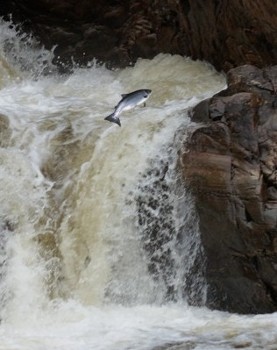Improved catches of early-running MSW salmon in Wester Ross
Posted: Friday 5 August, 2011 @ 15:50:02

Salmon anglers in late May and early June recorded some of the best catches of early running Multi-Sea Winter (MSW) salmon in recent years. High water through the latter part of May and early June provided ideal fishing conditions. Many of the fish taken were of 5kg (11lb) or over. Some magnificent fresh-run silver salmon of over 9kg (19lb) were caught and released in the River Ewe system, and similar-sized fish were reported from other rivers.
Many of these fish were in wonderful condition. Some anglers described the fish they had caught and released as the best they have ever taken.
Until 2011, early running MSW salmon had become increasingly scarce, with smaller grilse (one sea-winter salmon) representing an increasingly large proportion of the total angling catch. So why the improved catches of big fish?
Tony Andrews, Chief Executive of the Atlantic Salmon Trust, offered an explanation at a talk at Poolewe Village Hall on 7th July 2011. For much of the past decade, the NE Atlantic, where salmon from rivers around Scotland are taken by ocean currents in their first summer at sea, has been less productive with a shortage of food for salmon. The condition of many of the grilse returning to Scottish waters was a cause of concern as returning fish became thinner and thinner. In contrast, the seas around Greenland became unusually productive with an abundance of food. Salmon which survived to spend their second and any subsequent years at sea, fed well.
2010 was one of the best grilse year for rivers in Wester Ross and around Scotland for many years (see: http://www.wrft.org.uk/news/newsitem.cfm?id=121). Feeding conditions in the NE Atlantic in 2009 may have been better than in previous years this century. More recently, as Britain was plunged into freezing conditions in December 2010, the jetstream brought unusually mild conditions to the seas around Greenland and northern Canada. Hudson Bay was unusually late in freezing over in 2010. Not good news for polar bears, however, for salmon in their second and third year at sea, conditions may have been ideal.
Some of Tony’s presentation, including pictures of the ‘fat oily salmon’ caught in the seas to the west of Greenland prior to their return migration to European rivers, can be found via the Atlantic Salmon Trust Website at: http://www.atlanticsalmontrust.org/assets/tonyandrewsscumbriartapr11.pdf
So what are the prospects for the remainder of the 2011 salmon angling season? Within the next week or two we’ll have a clearer understanding of how the 2010 smolt year class has performed at sea as grilse return to Wester Ross rivers.